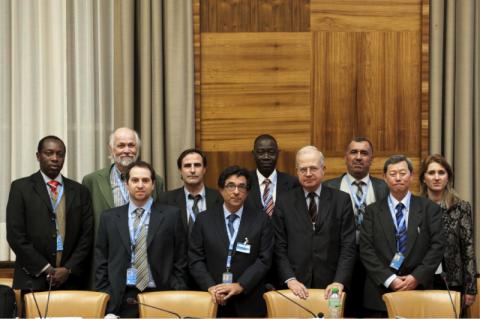
During its ninth session that was held from 7-18 September 2015, the Committee on Enforced Disappearances (CED) adopted a list of 25 questions that will be discussed during the initial review of Tunisia by the Committee in March 2016. In particular, the Committee sought to remind Tunisia that no exceptional circumstances − including terrorism − can be invoked to justify enforced disappearance, as enshrined in the International Convention on the Protection of all Persons against Enforced Disappearances (ICPPED), binding on Tunisia by virtue of its ratification on 29 June 2011.
Three months earlier, on 12 June 2015, Alkarama had sent the Committee its contribution to Tunisia's periodic review, which the State must undergo following its ratification of the Convention. Tunisia also submitted a periodic report in which it lists efforts made to meet its obligations under the Convention.
The Committee on Enforced Disappearances (CED) requested clarification from Tunisia
Considering that this report contained many inaccuracies, the CED asked Tunisia to provide clarifications, including on how to reconcile the need to fight against terrorism and the obligation to comply with ICCPED Article 1(2), which states that "No exceptional circumstances whatsoever, whether a state of war or a threat of war, internal political instability or any other public emergency, may be invoked as a justification for enforced disappearance."
The Committee did not fail to point out that the new anti-terrorist law adopted on 24 July 2015 by the Assembly of People's Representatives (ARP) − The Tunisian Parliament − which extends the maximum time in custody from 6 to 15 days, leads to abuses and is therefore incompatible with the principles contained in this article.
"We are concerned to see adopted such a law, which further weakens the protection of detainees and undoubtedly leads to worsening violations," said Imène Ben Younes, Legal Officer for North Africa at Alkarama. "It is particularly worrying that the international community continues to praise the Tunisia's progress in terms of respect for human rights, when the country has registered a record high number of suspicious deaths in custody between 2014 and 2015."
Alkarama had already highlighted Tunisia's lack of efforts to eradicate the practice of secret detention. The national report concedes that the crime of enforced disappearance, as defined in ICCPED Article 2, has still not been criminalised. The Tunisian Penal Code criminalises the offence of abduction, but no ban aimed specifically at the practice of enforced disappearance committed by State agents exists.
Enforced disappearances and risk of torture
This legal uncertainty contributes to a climate of impunity that is still enjoyed by Tunisian security forces, which have always used this practice systematically under the pretext of fighting against terrorism, including in the detention centres of El Gorjani and Kasserine, where torture is systematically practiced. Hence 25 year-old engineer Zied Younes was arrested at his family home in the middle of the night by agents of the Counter-Terrorism task force, before driving him to the premises of the security services of Kasserine, where he was subjected to various kinds of abuse, including put in the so-called "roast chicken" position, in order to make him confess to possessing weapons and planning terrorist attacks. Subsequently held in prison in El Gorjani, the young engineer was again subjected to torture and ill-treated, including through electrocution and deprivation of sleep, water, food and access to sanitary facilities.
Tunisia must establish efficient preventive mechanisms
The Committee therefore asked the Tunisian authorities to further explain how they intend to ensure that persons deprived of their liberty are guaranteed their right to contact their family and lawyer during the first hours of their arrest.
The Committee also calls on Tunisia to provide more information on possible actions to be taken to better prevent enforced disappearances. Alkarama had suggested conducting a proactive policy through better training of public officials involved in the fight against terrorism, in order to better prevent this practice that remains persistent since the 2011 revolution. The Jasmine Revolution was the expression of the people's will to end the authoritarian practices of the Ben Ali regime. It is clear, however, that the use of forced disappearances has not disappeared.
For more information or an interview, please contact the media team to media@alkarama.org (Dir: +41 22 734 1008).
